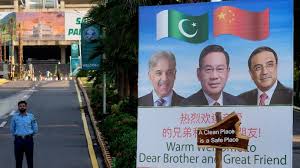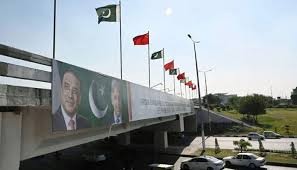SCO meeting: Why is it a big deal for Pakistan?

Islamabad: Pakistan is hosting a two-day gathering of the leaders of the Shanghai Cooperation Organization (SCO) — a security grouping created by China and Russia to counter the Western-led global order — starting from Tuesday.
The SCO comprises China, Russia, India, Pakistan, Iran, Kazakhstan, Kyrgyzstan, Tajikistan, Uzbekistan, and Belarus.
The bloc claims to represent 40% of the world’s population and about 30% of its GDP.
However, its members have diverse political systems. Some of them, such as India and China, are also regional competitors and have border disputes.

For the gathering in Pakistan, China, Russia and other major SCO players are sending their prime ministers, but India will be represented by External Affairs Minister Subrahmanyam Jaishankar.
“SCO member states get to host summits by rotation so it was Pakistan’s turn to do so,” Maleeha Lodhi, former Pakistani diplomat and foreign affairs analyst, told DW.
“It does, however, help to elevate Pakistan’s diplomatic standing and show that it is an active player in multilateral forums,” she added.
Authorities have deployed troops on the streets of the capital Islamabad, arrested hundreds of supporters of jailed opposition leader and former Prime Minister Imran Khan, and introduced new laws that restrict protests.

Michael Kugelman, a South Asia expert at the Washington-based Woodrow Wilson Center for Scholars, said that the summit was “a really big deal” for the Pakistani government.
“It’s sensitive about criticism that Pakistan isn’t safe for foreigners, and feels it has something to prove with this SCO meet — and especially with such high-level attendance from key countries in the neighborhood, including close ally China,” he told DW.
“There’s a lot at stake for Pakistan with this summit, given domestic imperatives around ensuring security and given the strategic importance of SCO itself,” he stressed.
A recent deadly attack on a convoy of Chinese engineers in the port city of Karachi has once again put the spotlight on the poor security situation in the country.
Separatist groups, particularly in the restive southwestern Balochistan province, have routinely targeted Chinese nationals working on projects related to the China-Pakistan Economic Corridor (CPEC), which is part of Beijing’s multibillion-dollar Belt and Road Initiative (BRI).

On Monday, Chinese Premier Li Qiang arrived in Pakistan to attend the SCO meeting, as well as for a four-day bilateral visit. His visit is the first by a Chinese head of government to Pakistan in 11 years, Pakistan’s Prime Minister’s Office said.
During the trip, the Chinese premier is expected to hold talks with Pakistani Prime Minister Shehbaz Sharif, Pakistani President Asif Ali Zardari and other senior political and military leaders over the deepening of bilateral ties.
He will also likely inaugurate the CPEC-funded Gwadar International Airport in Balochistan, which borders Afghanistan and Iran.
Pakistan: What’s behind the Balochistan armed insurgency?
Despite authorities pulling out all the stops to prevent untoward incidents, Pakistan’s domestic concerns are likely to dominate the sidelines of the summit, with ex-PM Khan’s Pakistan Tehreek-e-Insaf (PTI) partythreatening to stage protests.
“It’s not a surprise that the PTI wants to hold protests during the summit: It wants to bring attention to its cause, and make the government look bad,” said Kugelman. “From the PTI’s perspective, there’s no better time to do that than during the summit, when all eyes will be on Pakistan for a high-level international conference.”
“Islamabad knows this, of course. So it will take all kinds of measures, including quite possibly muscular ones, to avoid any trouble,” he added.
For her part, Lodhi said that the political turmoil in Pakistan would “have no bearing on the SCO summit.”
A rare visit from India
Meanwhile, Jaishankar’s presence at the gathering marks a rare visit to Pakistan by a senior Indian leader.
The Indian external affairs minister has already said that he will not discuss bilateral relations and focus solely on SCO-related multilateral affairs.
“Jaishankar’s participation is much more about SCO than India-Pakistan relations. He’s coming to Islamabad to demonstrate India’s commitment to SCO, not to strengthen India-Pakistan ties,” Kugelman said.
Nevertheless, he pointed out that Jaishankar’s attendance would “bring a boost to bilateral ties, even if an indirect one.”
“The fact that Jaishankar is coming shows that India-Pakistan relations have stabilized to the point that New Delhi is comfortable having him attend the summit,” he added.
Amit Ranjan, a research fellow at the Institute of South Asian Studies, National University of Singapore, echoed this view.
“There is no plan for any bilateral engagement,” he said. “During the summit, Jaishankar is likely to shake hands with his Pakistani counterpart and interact briefly but such actions are diplomatic formalities.”
“In some cases, such activities break impasse but it seems that, at present, India and Pakistan are not ready to engage.”





